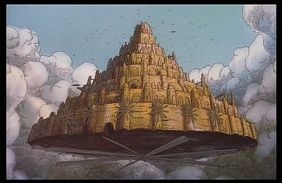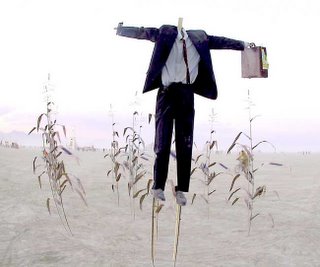There are endless things that we should do for our own good, and often we neglect to do those good things or even do things that harm us because we feel like doing so. We are not acting rationally when we harm ourselves. We, being adults, being free man and women, do as we please, regardless of the potential or actual harm we might do to ourselves, and it's not any one else's business. Or is it?

There is no shortage of minders to tell us what we do is harmful, wrong, immoral, bad, or evil. We have police. We have a military. We have minders of all sorts. We have our little social conventions, and we have rules against writing "nigger." We have rules against being, speaking, acting in ways politically incorrect.
We have rules and laws that prevent us from harming ourselves, and we have rules and laws preventing us from harming others, and punishments for those who transgress. Islam is a rule system unlike any other on Earth in history, one that has rules of behaviour that affect every possible bodily function and possible behaviour, but that rarely interfere with ones innate moral self. It's all about orthopraxy, right behaviour. Lie, cheat, steal, rape women, molest children, murder at random, but don't ever wear Nike shoes because to do so would be to associate partners with Allah. We in the West are running a close second behind Islam as a neurotic and petty-minded totalitarianism.
How we see others determines how we will live as private people. If we distrust others we will demand laws that control their behaviour, and those laws will constrict us as well. We will eventually devolve into outright fascism in our societies, the anti-Humanist view that Men are evil and that only the strong among us can rightly rule. We will live in a republic that would bring tears of joy to Plato's eyes.We'll live a lie that will be possibly comfortable so long as we never seek for the truth that might be too evil for us to bear. And we will never know. We'll be too busy spying on each other to seek out anything other than suspected deviations for the laws.
Today in the West we have great and deep thinkers who study social sciences and who know what's right and good for all. They are today's philosopher kings. They rule by the authority of.... We let them rule because we let them rule. I do not know why. Maybe they know what's better for us than we know.
In the following excerpts from Plato's Republic we will see the origins of the philosopher kings, and we'll see too the Myth of the Metals. To those who ask why we in the West endure the endless savageries of Muslims in our midsts, I reply that one may find some basic answers below:
****
The Royal Lie I;
[Book III, Socrates and Adeimantus, p. 651]
SOCRATES: Again, truth should be highly valued: if, as we were saying,
 a lie is useless to the gods, and useful only as a "medicine" to men, then the use of such "medicines" should be restricted to "physicians"; private individuals have no business with them.
a lie is useless to the gods, and useful only as a "medicine" to men, then the use of such "medicines" should be restricted to "physicians"; private individuals have no business with them.ADEIMANTUS: Clearly not.
SOCRATES: Then if any one at all is to have the privilege of lying, the rulers of the State should be the persons; and they, in their dealings either with enemies or with their own citizens, may be allowed to lie for the public good. But nobody else should meddle with anything of the kind; and although the rulers have this privilege, for a private man to lie to them in return is to be deemed a more heinous fault than for the patient or the pupil of a gymnasium not to speak the truth about his own bodily illnesses to the physician or to the trainer, or for a sailor not to tell the captain what is happening [next page, Book III, p. 652] about the ship and the rest of the crew, and how things are going with himself or his fellow sailors.
ADEIMANTUS: Most true.
SOCRATES: If, then, the ruler catches anybody beside himself lying in the State, "Any of the craftsmen, whether he be priest or physician or carpenter", he will punish him for introducing a practice which is equally subversive and destructive of ship or State.
ADEIMANTUS: Most certainly ... if our idea of the State is ever carried out.
SOCRATES: ... Then we shall approve such language as that of Diomede in Homer, "Friend, sit still and obey my word.", and the verses which follow, "the Greeks marched breathing prowess, ... in silent awe of their leaders," and other sentiments of the same kind.
ADEIMANTUS: We shall.
****
It's been my observation that a man has but one life on this Earth, and it is significant to take it from him. But as significant is to prevent him form living the life he has; and it is my position that the philosopher kings do just that by not allowing people to die.Minding people from the cradle to the grave is to rob people of the only life they will ever have. To steal a man's life from him for the sake of gratifying ones own sake of superiority is a crime that should be punished, according to me, by public hanging from the first lamp post. But I'm cranky. I write "nigger." What do I know? Others know better, it's certain. Some of them are born to rule:
****

The Royal Lie II:
[Book III, Socrates and Glaucon, p. 679]
SOCRATES: And perhaps the word "guardian" in the fullest sense ought to be applied to this higher class only who preserve us against foreign enemies and maintain peace among our citizens at home, that the one may not have the will, or the others the power, to harm us. The young men whom we before called guardians may be more properly designated auxiliaries and supporters of the principles of the rulers.
GLAUCON: I agree with you ...
SOCRATES: How then may we devise one of those needful falsehoods of which we lately spoke -- just one royal lie, which may deceive the rulers, if that be possible, and at any rate the rest of the city?
GLAUCON: What sort of lie ... ?
SOCRATES: Nothing new ... : only an old Phoenician tale of what has often occurred before now in other places [ref. = Plato's Laws, 663E] .. though not in our time, and I do not know whether such an event could ever happen again, or could now even be made probable, if it did.
GLAUCON: How your words seem to hesitate on your lips!
SOCRATES: You will not wonder ... at my hesitation when you have heard.
GLAUCON: Speak ... and fear not.
SOCRATES: Well then, I will speak, although I really know not how to look you in the face, or in what words to utter the audacious fiction, which I propose to communicate gradually, first to the rulers, then to the soldiers, and lastly to the people. They are to be told that their youth was a dream, and the education and training which they received from us, an appearance only; in reality during all that time they were being formed and fed in the womb of the earth, where they themselves and their arms and appurtenances were manufactured; when they were completed, the earth, their mother, sent them up; and so, their country being their mother and also their nurse, they are bound to advise for her good, and to defend her against attacks, and her citizens they are to regard as children of the earth and their own brothers.
GLAUCON: You had good reason ... to be ashamed of the lie which you were going to tell.
SOCRATES: True ... but there is more coming; I have only told you half. Citizens, you shall say to them in our tale, you are brothers, yet God has framed you differently. Some of you have the power of command, and in the composition of these he has mingled gold, wherefore also they have the greatest honor; others he has made of silver, to be auxiliaries; others again who are to be husbandmen [next page, Book III, p. 680] and craftsmen he has composed of brass and iron; and the species will generally be preserved in the children. But all are of the same original stock; a golden parent will sometimes have a silver son, or a silver parent a gold son. And God proclaims as a first principle to the rulers, and above all else, that there is nothing which they should so anxiously guard, or which they are to be such good guardians, as of the purity of the race. They should observe what elements mingle in their offspring; for if the son of a golden or silver parent has an admixture of brass and iron, then nature orders a transposition of ranks, and the eye of the ruler must not be pitiful towards the child because he has to descend in the scale and become a husbandman or artisan, just as there may be sons of artisans who having an admixture of gold or silver in them are raised to honour, and become guardians or auxiliaries. For an oracle says that when a man of brass or iron guards the State, it will be destroyed. Such is the tale; is there any possibility of making our citizens believe in it?
GLAUCON: Not in the present generation, he replied; there is no way of accomplishing this; but their sons may be made to believe in the tale, and their sons' sons, and posterity after them.
SOCRATES: I see the difficulty ... ; yet the fostering of such a belief will make them care more for the city and for one another. Enough, however, of the fiction, which may now fly abroad upon the wings of rumour, while we arm our earth-born heroes, and lead them forth under the command of their rulers.
****
[Book III, Socrates and Glaucon, p. 681]
 SOCRATES: And not only their [guardians] education, but their habitations, and all that belongs to them, should be such as will neither impair their virtue as guardians, nor tempt them to prey upon the other citizens. Any man of sense must acknowledge that.
SOCRATES: And not only their [guardians] education, but their habitations, and all that belongs to them, should be such as will neither impair their virtue as guardians, nor tempt them to prey upon the other citizens. Any man of sense must acknowledge that.GLAUCON: He must.
SOCRATES: Then let us consider what will be their way of life, if they are to realize our idea of them. In the first place, none of them should have any property of his own beyond what is absolutely necessary; neither should they have a private house or store closed against any one who has a mind to enter; their provisions should be only such as are required by trained warriors, who are men of temperance and courage; they should agree to receive from the citizens a fixed rate of pay, enough to meet the expenses of the year and no more; and they will go to mess and live together like soldiers in a camp. Gold and silver we will tell them that they have from God; the diviner metal is within them, and they have therefore no need of the dross which is current among men, and ought not to pollute the divine by any such earthly admixture; for that commoner metal has been the source of many unholy deeds, but their own is undefiled. And they alone of all the citizens may not touch or handle silver or gold, or be under the same roof with them, or wear them, or drink from them. And this will be their salvation, and they will be the saviours of the State. But should they ever acquire homes or lands or moneys of their own, they will become housekeepers and husbandmen in stead of guardians, enemies and tyrants instead of allies of the other citizens; hating and being hated, plotting and being pitted against, they will pass their whole life in much greater terror of internal than of external enemies, and the hour of ruin, both to themselves and to the rest of the State, will be at hand. For all which reasons may we not say that thus shall our State be ordered, and [next page, 682] that these shall be the regulations appointed by us for our guardians concerning their houses and all other matters?
http://www.lifeissues.net/writers/irv/irv_69plato2.html
****From Plato to B.F Skinner, there are dystopians abounding. Today we are in the grip of those who would rule us for our own good, and we seem to distrust our fellows so badly that we give up our own lives to have protection from them. We have ceded our authority to minders and philosopher kings. Our myths are lies, and our Moral, our reason for living, that is television.
I prefer the following version of Plato's Republic but to save myself months of typing I've settled for the version above. Oherwise, please refer to this: Plato, The Republic. Trans. G.M.A. Grube; revised by C.D.C. Reeve. Indianapolis: Hacket Publishing Co; 1992.



No comments:
Post a Comment